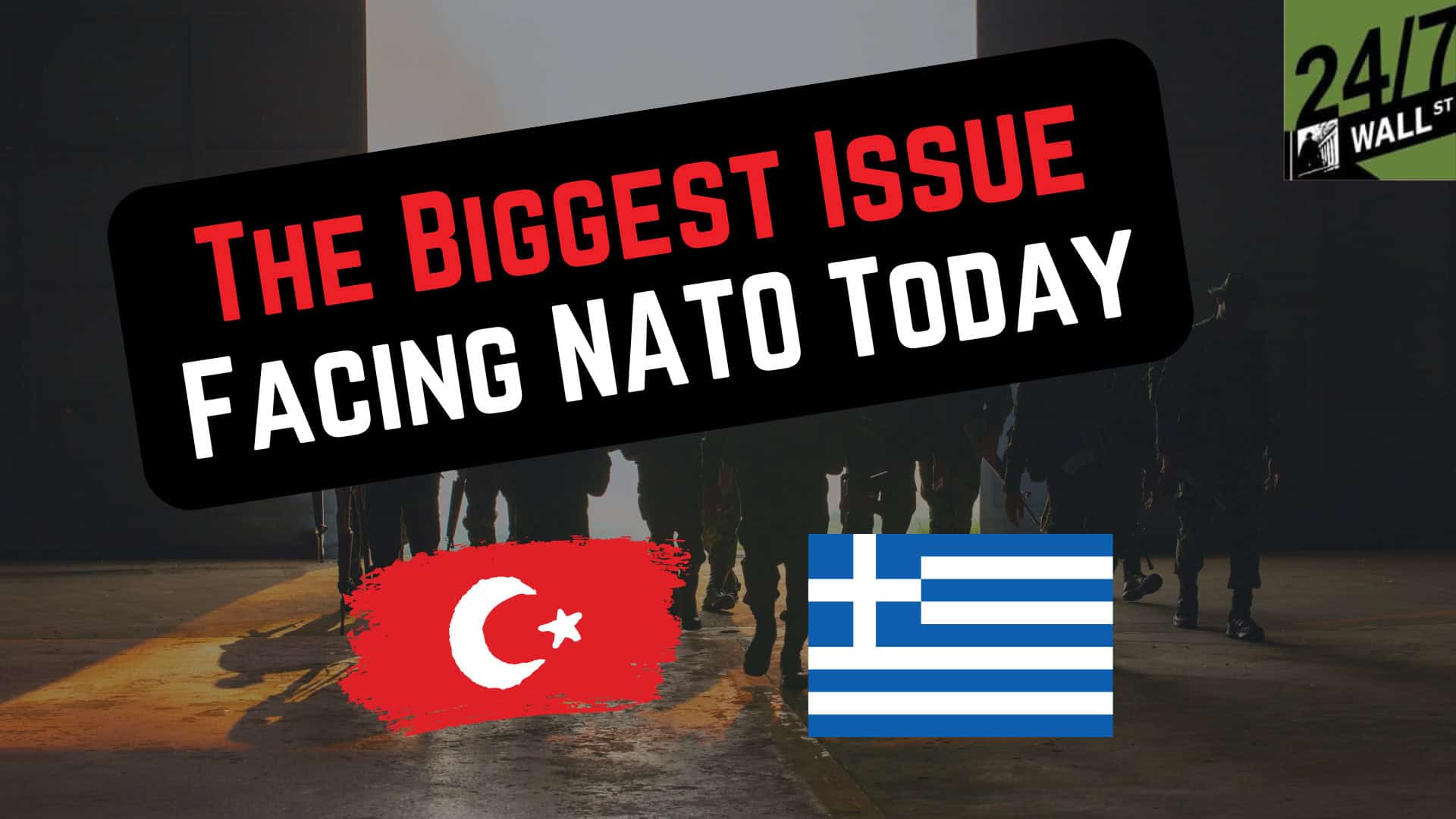
Key Points:
- Cyprus Conflict: Ongoing division between Greek and Turkish parts of Cyprus is a key NATO tension.
- Aegean Disputes: Greece and Turkey face unresolved maritime disputes, risking conflict.
- Diplomacy Needed: Resolving these issues requires careful diplomatic efforts within NATO.
- Also: The smart money is looking past this election and towards what may be the biggest investment opportunity of our lifetime. Learn about ‘The Next Nvidia’ today to see why.
Michael and Austin continue discussing internal NATO tensions, focusing on the ongoing Cyprus issue, a major point of contention between Greece and Turkey. Cyprus remains divided between the Greek-aligned Republic of Cyprus in the south and the Turkish-aligned Northern Cyprus, with a UN buffer zone separating the two. Additionally, there are disputes over several small islands in the Aegean Sea that nearly led to war between Greece and Turkey in 1996 and flared up again in 2020. Michael characterizes these tensions as “tense but salvageable,” noting that resolution will require careful diplomacy. He emphasizes that despite these conflicts, NATO has historically been one of the most successful alliances and remains viable if the willingness to resolve these issues is present.
Watch the Video
Edited Video Transcript:
The moment.
We spoke about Turkey and Greece.
We didn’t get to this.
So I think I really have to point this out because it’s probably the biggest internal issue in NATO right now is Cyprus.
So for those who aren’t aware, Cyprus has a huge Greek and huge Turkish population.
And there’s been a lot of tension between the two.
The problems between Greece and Turkey over Cyprus go back to the 50s and 60s.
But the Greeks backed the coup d’etat in 1974, which caused the Turks to invade.
And today, Cyprus is divided between Greece.
The Republic of Cyprus, which is the Greek-aligned part of Cyprus in the south, and the North Cyprus, which is aligned towards Turkey.
And there’s a buffer zone enforced by the UN.
There are also a couple of British air bases there too, which the locals aren’t terribly fond of.
I know this because back from my days in the Air Force Reserves, I actually went to Akrotiri and we were briefed to watch out for that.
Just a little personal experience there.
But yeah, the Cyprus problem has been ongoing for about 50 years now.
Whether it’s going to be a unified Cyprus or a two-state solution is still up in the air.
The tensions between Greece and Turkey are probably the most alarming aspect of the problems within NATO at the moment.
And, you know, just as a final thought here, thank you so much for adding that context.
If we were to look at the tensions between Greece and Turkey, we’ve got Cyprus and then there’s also just additional other territorial disputes in the area, I believe.
What would have to happen or rather, what are the main points of tension that still have to be solved for Greece and Turkey to get on better terms?
We’ve got Cyprus and what else?
Yeah, control of the islands in the Aegean Sea that I think I previously mentioned, return to Greek ownership.
But a lot of these are within touching distance of Anatolia.
And Greece and Turkey almost went to war in 1996.
Over that, there was accusations that Greece were militarizing these islands, many of which are really tiny chunks of rock with no people on them.
Yeah, in 96, it almost, if I remember correctly, a freighter almost went to ground.
And there was a bit of tit for tat.
An F-16 was shot down in October of 96.
And things were dangerously close to spiraling out of control.
And it was only American intervention that stopped war.
There was another flare up in 2020.
So yeah, it’s the maritime disputes.
You know, the waters around because they had again, it goes back to that agreement in 1923 that was supposed to settle all these disputes and that kind of after World War Two that kind of opened up again.
And that kind of longstanding hostility and historical rivalry between Greece and Turkey just kind of almost boiled over again.
So I characterize it as tense, but salvageable.
But it’s going to require some careful and artful diplomacy between the two nations.
But I think if there is a willingness, they can be solved is the point.
Well, Michael, thank you so much for helping us unpack so much of the complicated portrait that is NATO today.
Obviously, it’s not a perfect union, so to speak.
It is serving its intended purpose, even with all of these conflicts and tensions today.
We should point out that NATO, in just historical terms, is one of the most successful alliances and longstanding alliances historically has been a tremendous success.
But relationships take work.
And the more members there are, the more issues there are going to be.
But it is salvageable if the willingness is there.
And that’s what we’re going to see play out in the next couple of years is the eternal politics.
And if they can get through that, you know, NATO’s future, it’s still up in the air.
But I think there’s reasons to be optimistic.
Wonderful.
Well, we’ll leave it on that note then.
Michael, thank you so much for your time today and helping our readers understand the whole picture of this situation.
Take Charge of Your Retirement In Just A Few Minutes (Sponsor)
Retirement planning doesn’t have to feel overwhelming. The key is finding expert guidance—and SmartAsset’s simple quiz makes it easier than ever for you to connect with a vetted financial advisor.
Here’s how it works:
- Answer a Few Simple Questions. Tell us a bit about your goals and preferences—it only takes a few minutes!
- Get Matched with Vetted Advisors Our smart tool matches you with up to three pre-screened, vetted advisors who serve your area and are held to a fiduciary standard to act in your best interests. Click here to begin
- Choose Your Fit Review their profiles, schedule an introductory call (or meet in person), and select the advisor who feel is right for you.
Why wait? Start building the retirement you’ve always dreamed of. Click here to get started today!
Thank you for reading! Have some feedback for us?
Contact the 24/7 Wall St. editorial team.




